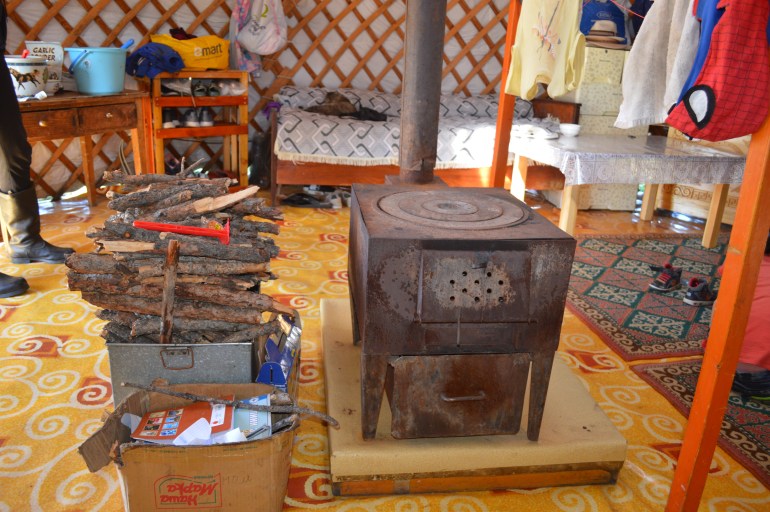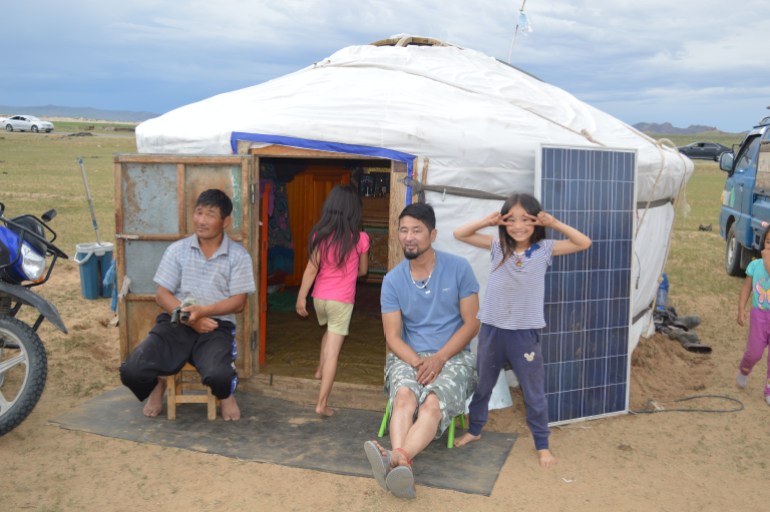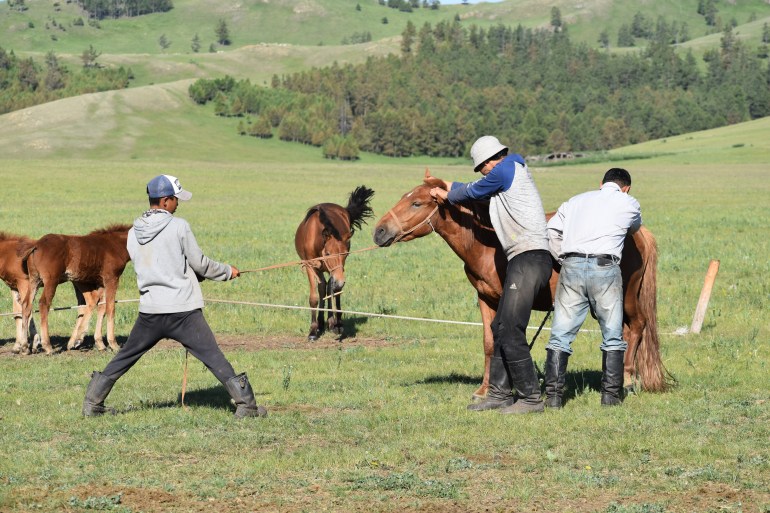Squeezed between China and Russia, Mongolia’s herders feel pinch
Mongolian tent-dwellers face growing hardship amid skyrocketing energy costs and falling livestock prices.

Ulaanbaatar, Mongolia – Dulamsuren Demberel, a 58-year-old herder who lives an eight-hour drive from Mongolia’s capital Ulaanbaatar, finds it harder each month to make the household budget work.
Prices of flour and rice, among the basic staples Mongolia’s herders cannot produce themselves, have soared due to the war in Ukraine, with overall inflation running at an eye-watering 14.5 percent.
Keep reading
list of 4 itemsCost of living: Becoming roommates with my son to pay the bills
Cost of living: Choosing between bread and phone data in S Africa
Cost of living: A couple’s move from tent to apartment
Even worse has been the 40 percent jump in the price of coal, as well as shortages recent protests have blamed on corrupt officials’ alleged theft of 385,000 tonnes of coal for sale in China.
In Mongolia, where winter temperatures often dip below -35°C, about 60 percent of the population lives in gers – traditional tents – that are not connected to the country’s Soviet-era heating and water grid, but instead heated using coal-powered stoves. More than one-quarter of households are made up of herders like Demberel, who relocate their flocks and gers several times per year.

“Last time when I went to the soum, they weren’t even selling coal,” Demberel, who shares her ger with her husband, her second-eldest son and his wife and five children, told Al Jazeera, referring to the provincial district nearby.
Meanwhile, Demberel, whose husband’s poor health leaves him unable to work, finds it hard to justify making the trek to Ulaanbaatar to sell sheep, wool and milk, the prices of which are in decline even as gasoline prices soar. Mongolia produces oil but, without a cost-effective means to refine it into gasoline, exports almost all of it to China.
While exports to China have declined in recent months as Mongolia’s economy slows under strict COVID-19 curbs, gasoline prices have risen as much as 65 percent since Russia launched its war in Ukraine in February.
“Unless you sell more than 30 sheep or something, it’s not worth it, even though we can sell in the city at a higher price,” Demberel said.
“It’s too far. Paying for gas and other expenses would just make it the same as selling it in the soum, unless you sell a lot.”
Mongolia, one of the world’s most sparsely-populated countries, is being squeezed economically by China and Russia, its two giant neighbours, which have historically dominated its vast landmass.
While Russia’s war in Ukraine has caused energy prices to skyrocket, China’s weakening economy has dampened trade even as some Mongolians question their government’s export of coal and other valuable resources to their southern neighbour.

Mongolia depends on Russia for electricity, gasoline, aviation fuel, liquefied petroleum gas (LPG) and diesel, about 60 percent of which comes from its northern neighbour.
China accounts for more than 80 percent of Mongolia’s total exports, 60 percent of imports and more than 40 percent of its gross domestic product (GDP). Mongolia’s dependence on its bigger neighbours is immediately obvious on visiting any store, where packaging is covered with Chinese and Russian writing.
“Of course, we’re fully dependent on China and Russia,” Narangerel, a 57-year-old businessman in Ulaanbaatar, told Al Jazeera.
“We’re dependent on China in terms of our economy, and we depend on Russia for electricity. Also, we buy 90 percent of our coal and petrol from Russia. All other consumer goods come from China.”
Mongolia gained independence in 1921, after nearly 300 years of rule by China’s Qing Dynasty. Until the collapse of communism in the early 90s, the socialist Mongolian People’s Republic operated as a satellite state of the Soviet Union.
Former Mongolian territories, Tuva, Buryatia and Altai are part of today’s Russian Federation, while China controls the geographic area of Southern Mongolia as the Inner Mongolia Autonomous Region.
While Mongolia is independent, Moscow and Beijing continue to exert significant influence over the country. After the Dalai Lama’s visit to Ulaanbaatar in 2016, China punished Mongolia by closing off the border. Although he is the spiritual head of the Tibetan Buddhist faith, practised by the majority of Mongolians, the Dalai Lama has not been invited back.

Mongolia’s economy shrank by 4.4 percent, prompting businesses to lay off tens of thousands of workers. Unemployment peaked at 8.5 percent in April of 2021 before declining to 5.4 percent in the third quarter of this year. Herders were not considered unemployed, although many could not get to the city to sell meat or milk during the height of the pandemic.
While the economy has rebounded, the recovery remains shaky due to China’s economic slowdown and the uncertain global economic outlook.
Mining revenue, which accounts for more than 20 percent of GDP, dropped by nearly one-quarter in the first two months of 2022, compared with the previous year.
Despite rebounding since October, resource export revenues remain well below pre-pandemic levels, with iron ore exports to China, one of the biggest money-makers, down 38 percent in the first eleven months of this year.
“We used to export fluorite to Ukraine, Russia and China. Now, we’ve stopped exporting to Ukraine. And because the border is closed with China, we can’t export to China,” M Uuganbaatar, a 40-year-old executive director at mining enterprise Bayan Jonsh Co, told Al Jazeera.
Previously, China accounted for 70 percent of Uuganbaatar’s business.
“Due to inflation, transportation and logistics, costs have increased,” he said. The one upside is that his exports are purchased in United States dollars, which he can use to hedge against a declining tugrik, the local currency.
So far this year, the tugrik has lost about 18 percent of its value against the dollar.
Oyuntsetseg Togoodorj, a kindergarten teacher in Ulaanbaatar who earns a salary of 800,000 tugriks ($234) a month, said feeding her four children is becoming increasingly difficult.
“Two hundred thousand tugrik ($59) a month, was enough to buy all we needed before but now it should be at least 600,000 ($176) to make barely enough to survive,” Togoodorj told Al Jazeera. “For the whole winter, we used to spend 400,000 ($117) for meat. Now it is 800,000 ($235).”
In addition to increased grocery bills, she is also dealing with higher school fees. “We’re paying four times what we used to pay last year.”

Anger and frustration over Mongolia’s dependence on its powerful neighbours is not hard to find.
Many Mongolians believe China and Russia discourage the construction of power-generation plants and factories in Mongolia for fear of losing their influence over the country. In one notable source of tensions, Russia has opposed the construction of a dam and hydropower generation plant along the Uldza River, claiming it would damage the ecology of Lake Baikal, which lies on the Russian side of the border.
While Moscow has protested the project on environmental grounds, many Mongolians believe its opposition is really motivated by a desire to keep their country subservient.
“Historically Russia claims to be our brother but they seem to keep us under thumb,” Ariunjargal Andrei, a 52-year-old construction engineer, told Al Jazeera. “We buy our electricity from Russia, so it isn’t beneficial for them if we build a hydropower plant. Therefore, they’re not allowing us to build it, claiming it’ll have a negative effect on Lake Baikal.”
“Russia is not allowing us to build the Enkh Gol power station,” Narangerel said. China is … we are getting so many loans that we are in really serious danger.”
For many Mongolians such as Narangerel, the answer to the country’s economic troubles lies in achieving greater independence.
“We’re not a producing country, we’re consumers,” he said.
Batmunkh, a 43-year-old accountant at the country’s fifth largest bank, Khas Bank, who, like many Mongolians goes by one name, summed up the country’s economic problems simply: “The central cause of the success or failure of the Mongolian economy is the Chinese economy and China’s anti-COVID policy.”